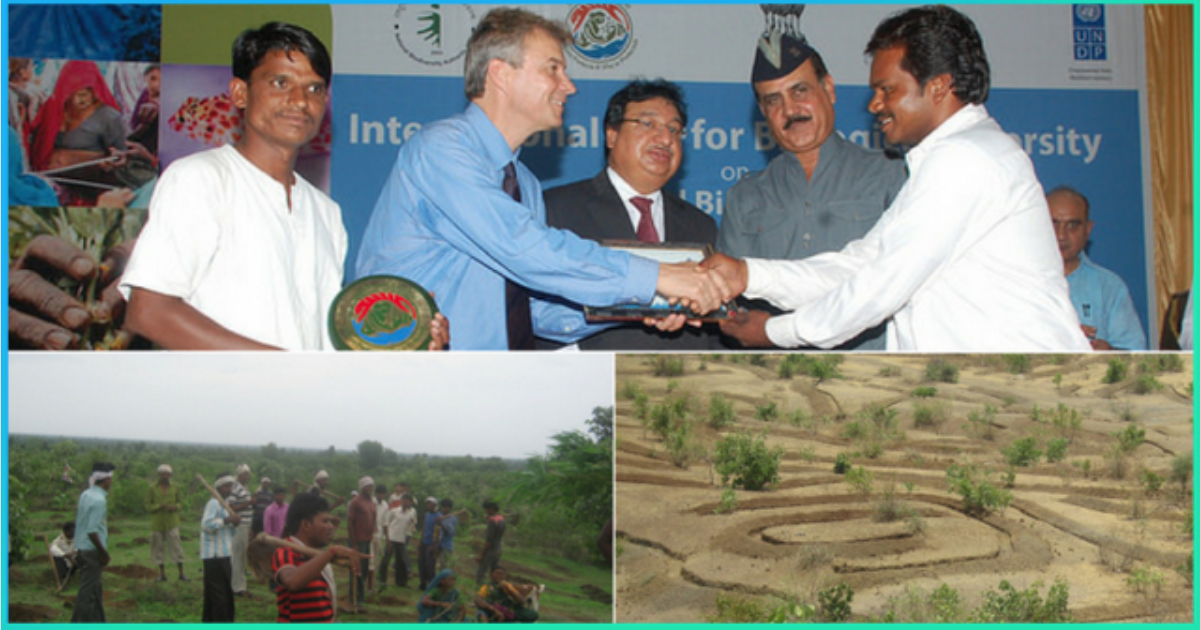
This Village Transformed Its 477 Acres Barren Land Into A Forest
25 April 2018 11:49 AM GMT
There are thousands of villages in India which blame the government for the hardships villagers face. They live troubled and unsatisfactory lives, waiting for someone to solve their problems and bring a new lease of life to their villages.
But one village in Maharashtra’s Amaravati district, Payvihir, changed the status quo on their own. Everyone came together and changed the fate of their village. The village has received many national and international awards and set an example for everyone.
It is the citizen’s right to make the government work for them, at the same time it is the citizen’s responsibility to perform their duties without fail. Payvihir’s citizens, instead of waiting for the government to intervene, took matters into their hands.
The result
- 182 hectares of degraded, parched land turned to a lush green forest;
- The village, which was empty because migration, is now ringing with activity and enthusiasm;
- Women are cooking food in smokeless kitchens;
- They are selling their organic fruits and vegetables through their brand “Naturals Melghat”;
- Country’s first solar-powered drip irrigation system;
- Payvihir bagged the Biodiversity Award from the United Nations Development Programme (UNDP);
- Maharashtra Wildlife Service Award presented by Sanctuary Asia in recognition of its invaluable contribution to environmental conservation in the state.
All these achievements of Payvihir have proved that when the whole community comes together, nothing is impossible.
Beginnings
It all started with planting trees.
For ages, villagers used to cut trees for various purposes. The result of this practice left no trees in the village surroundings. Soon, groundwater started depleting very fast, which led to a drought. The villagers began migrating to other places in search of work.
The youth in the village decided to take the issue into their hands. They concluded that bringing back the green cover will solve many problems in the village. In 2012, an NGO called Khoj helped Payvihir in getting 182 hectares of degraded land to exercise its community forest rights under the Forest Rights Act (FRA). Encouraged by Purnima Upadhyay of Khoj, the gram panchayat of Payvihir decided to devote its energies to regenerate and revive the biodiversity of the area.
Everyone in the village participated in planting trees and maintaining them as their own. The villagers protecting the trees were given wages under MNREGA. Problems like unemployment and migration were tackled by providing village development jobs to the locals under MNREGA.
“Naturals Melghat”
By 2015, the degraded land given by the forest department in 2012 became a flourishing mini forest. The mini forest attracted biodiversity to the area. Today, the forest is filled with deer, wild boars, sambar, jackals and hyenas. This small forest is their habitat, which is protected day and night by the villagers.
For this achievement, the United Nations awarded this village with the Biodiversity Award.
Afforestation and regeneration of flora and fauna, combined with improved governance, led to enhanced livelihood prospects of the villagers. The villagers, having tasted the power of community work, decided to jump into farming as a group. With the help of Khoj, villagers started farming custard apple using organic farming methods. They began selling their produce under the brand name “Naturals Melghat”. Soon, they began selling lemons, guava, mango, wheat, and jawar under the brand. Payvihir joined hands with three adjacent villages — Khatijapur, Upatkheda, and Kumbiwagholi — to sell 10 tonnes of sitafals(custard apple) under the brand “Naturals Melghat”, and recorded a turnover of Rs 5 lakh.
With all these developments, the income of the villagers improved. This brought back the school and the primary healthcare centre. Furthermore, a biogas plant now supplies biogas for three hours a day to every house in the village. With the earnings, the gram sabha has decided to utilise it for the development of health, education, and sanitation facilities of the village. Today, alcohol and tobacco are completely banned in the village. The villagers have agreed to plant 50,000 plants every year; they have planted 1,00,000 plants since four years. Also, villagers are taking measures to increase the fertility of the soil by planting different varieties of plants.
Villagers also constructed check dams and other soil & water conservation structures (continuous collecting trenches and water absorption trenches) using MGNREGA funds.Overgrazing is a major reason for deforestation. Village committees have demarcated specific areas for grazing and routinely guard afforested areas. Planting fodder has helped with rearing cattle. Cattle dung is used for a piped distribution bio-gas system in the village to reduce dependence on the forest for the fuel.
The problem of migration and unemployment in the village were tackled by providing village development jobs to the locals under MNREGA. NGO Khoj has been an immense help in providing inputs to the villagers.
Once upon a time, Payvihir was under the reign of poverty and negligence. Now the village is self-sustainable. This story proves again that “Saving Trees Saves Life.”
With #MySocialResponsibility, we aim to bring you more inspiring stories of individuals and organisations across the globe. If you also know about any changemakers, share their story at [email protected] and we'll spread the word.
 All section
All section













